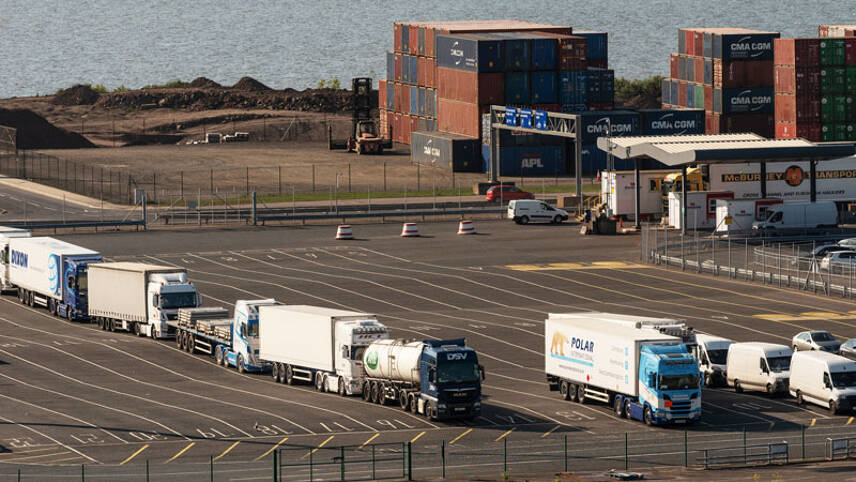Register for free and continue reading
Join our growing army of changemakers and get unlimited access to our premium content

Pictured: HGVs at the Port of Liverpool
Zero-emission HGVs are exempted from paying the HGV levy, provided they are emission-free at the tailpipe and would also be otherwise exempt from vehicle excise duty (VED). This exemption does not extend to hybrid vehicles.
Introduced in 2014, the HGV levy aims to ensure that all HGVs weighing 12 tonnes and above contribute to the Treasury for the use of UK roads.
The HGV levy applies to non-UK registered vehicles and excludes vehicles registered on the Isle of Man, the Channel Islands, or UK overseas territories. The responsibility for paying the levy lies with the driver, the operator, or a booking agent.
Failure to pay the correct HGV levy when entering the UK road network results in penalties. The UK enforcement agencies have been tasked with monitoring compliance and will issue a £300 roadside fine to offenders.
In February 2019, the UK Government introduced lower levies for less-polluting vehicles, but the tax was temporarily suspended in August 2020 to support pandemic recovery efforts.
With the levy now back in force, the Government has shifted its focus towards its goal of achieving 100% zero-emission HGVs by 2040.
Green groups push for distance-based charging
Environmental groups including Green Alliance, Transport Action Network, Possible, and Transport & Environment are urging the government to adopt a ‘polluter pays’ principle in UK freight operations beyond the change to the HGV levy.
The green groups have proposed a transition from the current day-based levy to distance-based charging, offering discounts or exemptions for zero-emission lorries to make them cost-effective.
The groups suggest that any reform should be mindful of cost-of-living pressures by implementing charges gradually and using the funds to incentivise clean trucks, improve driver facilities, and establish recharging sites.
Green Alliance’s policy adviser Johann Beckford said: “It is important that the freight sector isn’t given a free ride to pollute. The reintroduction of the HGV levy is, therefore, a positive step.
“However, Europe is miles ahead at embedding the polluter pays principle into the road freight sector. There is a clear move toward tolling based on the distance travelled and how polluting each vehicle is. These charges are far higher than the UK’s HGV levy and therefore provide a far greater incentive to plan journeys effectively and can help make battery electric trucks cost competitive.”
Transport Action Network’s director Chris Todd said: “The road freight sector urgently needs to transition to cleaner vehicle types, and we need to increase the proportion of our freight transported by rail.
“Battery electric trucks are one solution and while costs are falling, more needs to be done to make them cost-competitive with diesel trucks. Distance-based charging is one solution that can help that.”
MPs on the House of Commons Select Committee stated last year that they see “no viable alternative” to a national road pricing scheme where motorists pay per mile. Without this, funding raised through VED and fuel duty will dwindle as more zero-emission vehicles roll out.


Please login or Register to leave a comment.